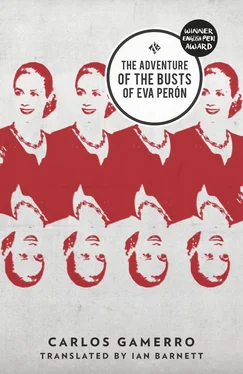Carlos Gamerro - The Adventure of the Busts of Eva Perón
Здесь есть возможность читать онлайн «Carlos Gamerro - The Adventure of the Busts of Eva Perón» весь текст электронной книги совершенно бесплатно (целиком полную версию без сокращений). В некоторых случаях можно слушать аудио, скачать через торрент в формате fb2 и присутствует краткое содержание. Год выпуска: 2015, Издательство: And Other Stories, Жанр: Современная проза, на английском языке. Описание произведения, (предисловие) а так же отзывы посетителей доступны на портале библиотеки ЛибКат.
- Название:The Adventure of the Busts of Eva Perón
- Автор:
- Издательство:And Other Stories
- Жанр:
- Год:2015
- ISBN:нет данных
- Рейтинг книги:3 / 5. Голосов: 1
-
Избранное:Добавить в избранное
- Отзывы:
-
Ваша оценка:
- 60
- 1
- 2
- 3
- 4
- 5
The Adventure of the Busts of Eva Perón: краткое содержание, описание и аннотация
Предлагаем к чтению аннотацию, описание, краткое содержание или предисловие (зависит от того, что написал сам автор книги «The Adventure of the Busts of Eva Perón»). Если вы не нашли необходимую информацию о книге — напишите в комментариях, мы постараемся отыскать её.
Carlos Gamerro's novel is a caustic and original take on Argentina's history.
The Adventure of the Busts of Eva Perón — читать онлайн бесплатно полную книгу (весь текст) целиком
Ниже представлен текст книги, разбитый по страницам. Система сохранения места последней прочитанной страницы, позволяет с удобством читать онлайн бесплатно книгу «The Adventure of the Busts of Eva Perón», без необходимости каждый раз заново искать на чём Вы остановились. Поставьте закладку, и сможете в любой момент перейти на страницу, на которой закончили чтение.
Интервал:
Закладка:
At that moment Don Rogelio had clinked his glass with a coffee spoon to call for silence for the toast.
‘To all of this,’ said Don Rogelio, taking in the throng with an ecumenical gesture. ‘We don’t ask for much, do we? This will do. But we’ll not be content with less.’
It was true, so true, thought Marroné, as if the words had been meant specially for him. Wasn’t this what life was all about? Was there anything else one could ask for? And at that moment, he had a vision of himself in thirty or forty years’ time, in another life: a Peronist patriarch in a house like this, surrounded by children and grandchildren, reaching a serene and ripe old age, eating the secure fruit of his harvest in peace beneath his vine. Could proletarianising be the way forward, after all? Had Paddy been right all along? Had this scene been conjured by his friend for his edification from beyond the grave? The cherished syllables came back to him: ‘If you like… I can give you a hand.’ But he’d taken no notice and slapped the hand away, he thought, flagellating himself to the verge of tears once again. He was becoming a crybaby. ‘And a proletarian crybaby at that!’ the sly side of his mind whispered in his ear. He mentally shooed it away with a ‘But it isn’t too late’. His friend wouldn’t have died in vain. Yes, that was exactly what he’d do: give up this senseless, monomaniacal search for the busts, abandon the rat race of the business world and leave everything behind. Everything: Sr Tamerlán, his wife, his in-laws, the house in Olivos. Then he’d sort out his bourgeois children’s visiting regime — because in his new life, naturally, he planned on having others — and come and live in Ciudad Evita. It couldn’t be as hard for him as it had for Paddy, after all. In the space of a few days he’d almost unwittingly made as much — or more — progress than his late friend had in months. ‘Or rather regress,’ his mind took to whispering again, for in his case it wasn’t so much a matter of taking the plunge into a new world as of rediscovering his roots; not of wrenching his fate out of joint, but of straightening out the kink others had inflicted on it… of going back to his origins, of listening to the call coursing through his veins…
Don Rogelio had seated him on his right-hand side and, with a fresh cheroot fuming away in his hand, engaged him in conversation, which Marroné, revived by the ravioli and red wine, listened to with the utmost reverence, for he had decided this man would be his guide and role model in the new life he was about to embark on. Sitting on at the table after lunch, the bees buzzing about the green grapes that hung from the vine above, the newborn cicadas singing, and beetles with metallic-green wing cases and antennae with black pompoms drowning in the wine at the bottom of their glasses, Marroné felt he had found his way at last, especially when Don Rogelio leant over to him and, in the tone of a grandfather who has prepared his grandson a surprise, said into his ear:
‘I’d like to introduce you to a friend of mine.’
They had only to cross the road, which shimmered like a piece of corrugated iron under the mid-afternoon sun, and walk through the pillars and the few cars parked in the shade of the tower block, to reach the entrance. They went up by the only lift in working order (the other two weren’t only not in working order, but their doors were welded shut); it was an open lift shaft and, as they ascended, Marroné was treated to a series of extended panoramic views of Ciudad Evita through the double-grille doors: a succession of red-tile roofs and bright-green treetops stretching out to the perimeter that etched her profile into the land. The building grew slummier the higher they got, and the small green-grey tiles grew thinner on the walls: where the flats of the ground floor had seemed fairly decent, the top floor was a succession of dilapidated lairs, and there was no further sign of any tiling. From the corridor on the right his nostrils were flooded by the combined aroma of grilled meat, woodsmoke and pitch — and a snippet of his father-in-law’s after-dinner wisdom came back to him, ‘These Peronists! They give the darkies proper apartments to live in and first thing you know they’ve gone and ripped up the floors for their asados !’ — and, still hungry despite all the ravioli, he was on the verge of grabbing Don Rogelio by the arm and suggesting they gatecrash the gathering; but the sculptor had already taken the left corridor, at the end of which was a glass-brick wall. In the blinding back-lighting his guide was reduced to a supernatural silhouette, and Marroné felt as if he were following him, not into one particular apartment or another, but into the light itself. They passed doors secured with padlocks, doors repaired with planks, doors sealed with barricade tape saying ‘POLICE LINE — DO NOT CROSS’, and knocked twice on the last one on the right.
‘Alright! Alright! Keep your shirt on!’ answered a gruff voice from inside, and soon enough they heard the drawing back of bolts, and the door opened as far as the chain would allow. ‘Oh, it’s you,’ said the voice, recognising Don Rogelio. ‘Why don’t you let me know beforehand?’ He closed the door and opened it again, this time wide.
The shutters were down and the room was dingy; fortunately enough as it turned out, because seeing it in the clear light of day could have been a very depressing experience. General disorder vied with the dirt and the bizarre layout: a television on the bed, a bicycle serving as a clothes horse for underwear, a stiff and dusty suit on a coat-hanger hanging on a nail on the wall, like an installation in a gallery. It was the kind of habitat a single man can only achieve after long years of dreary celibacy. The man must have been Don Rogelio’s age, but the same years seemed to have passed over him not once but several times, like a car reversing over roadkill again and again to finish it off. He was taller than Don Rogelio but his hunched shoulders made him look more or less the same height, his skin was the colour of the ash overflowing from his ashtrays, and he coughed continuously. After introducing them and giving his friend a light-hearted ticking-off for not accepting the services of a cleaning lady he’d recommended, and after Rodolfo — for that was the name of the owner of the apartment — retorted with a growl and a ‘She’s after something else that one is’, Don Rogelio came to the point, still all mystery.
‘The comrade here wants to see them.’
To Rodolfo’s raised eyebrows Don Rogelio responded by taking hold of Marroné’s shoulder and resting his arm on it as if on a firm and reliable support.
‘It’s ok. He’s with me.’
Rodolfo ushered them to another door in the same corridor, next to the lifts. After a brief tug of war Rodolfo managed to extract the padlock from the two rings it gripped and gave the door a shove. Marroné was expecting more or less the same kind of dingy hovel as the first, but was hit by a blinding light that poured in torrents through the wide windows of a vast room, which in some earlier day and age must have been a tea room with a panoramic view of Ciudad Evita. A second later his eyes managed to focus on its contents and he knew what Ali Baba must have felt when he stumbled upon the treasures of his cave. Overflowing from shelves, counters, niches, tables, packing cases and chairs, and spilling out over the floor, were more busts of Perón and Evita than he had ever seen or could even imagine. They came in all sizes and materials: white plaster or cement, painted gold, silver or black, cast in bronze, some gleaming, others weathered and green; carved in marble, granite, onyx or wood; modelled in clay or terracotta; some the size of a fist, others twice life-size; most with neoclassical, but some with romantic or even pre-Colombian features. Mass-produced pieces featured more abundantly, but there was no shortage of original works of artistic merit. But that was the least of it: the main thing was that there were enough Evas in this room to fill three office buildings like his, and as he gazed at them, Marroné felt his pupils narrow to two vertical slits; his tail, had he had one, would have rhythmically lashed his sides. Like the cat that won’t take its eyes off the canary but keeps purring to demur its intent, he asked in a voice that was barely more than a hiss:
Читать дальшеИнтервал:
Закладка:
Похожие книги на «The Adventure of the Busts of Eva Perón»
Представляем Вашему вниманию похожие книги на «The Adventure of the Busts of Eva Perón» списком для выбора. Мы отобрали схожую по названию и смыслу литературу в надежде предоставить читателям больше вариантов отыскать новые, интересные, ещё непрочитанные произведения.
Обсуждение, отзывы о книге «The Adventure of the Busts of Eva Perón» и просто собственные мнения читателей. Оставьте ваши комментарии, напишите, что Вы думаете о произведении, его смысле или главных героях. Укажите что конкретно понравилось, а что нет, и почему Вы так считаете.











